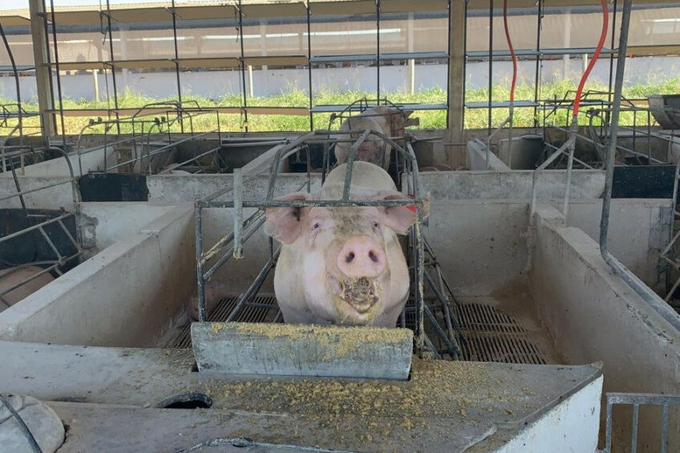December 8, 2025 | 22:55 GMT +7
December 8, 2025 | 22:55 GMT +7
Hotline: 0913.378.918
December 8, 2025 | 22:55 GMT +7
Hotline: 0913.378.918

Pork production in Brazil increased by 54.4% in volume. Photo: Daniel Azevedo Duarte.
During this period, pork production in the country increased by 54.4% in volume, from 3.4 million to 5.2 million tonnes. This result propelled the sector to a new level in productivity and export.
In terms of exports, the performance was even more impressive. Between 2015 and 2023, pork exports grew by 130.3%, rising from 472,500 to 1.08 million tonnes, according to the report. This leap contributed to balancing the Brazilian international trade account once the country’s share in the global pork market increased.
The rise in productivity also impacted the availability of pork for domestic consumption, which saw a 42.3% increase between 2015 and 2023 (from 2.95 million to 4.21 million tonnes).
According to the ABCS survey, the per capita pork consumption on the domestic market increased from 15.1 kg in 2015 to 20.6 kg during this period, a rise of 36.4%. This increase was driven by greater consumer acceptance of pork in Brazil, supported by campaigns encouraging its consumption.
The number of commercially kept sows also rose considerably. The 2023 survey identified that the Brazilian herd of these sows reached 2.1 million animals. The highest concentration of sows is in the southern region (Santa Catarina, Rio Grande do Sul, and Paraná), which accounts for 61% of the national herd.
Brazilian pig farming is a highly complex economic sector that adopts different production models. Of the total production, 41% of the sows belong to the integrated model, 35% to cooperatives, and 24% to independent producers.
The integrated model involves contracts between producers and large companies, such as JBS and BRF. In this model, these industries provide inputs (genetics, feed, and medication), while producers are responsible for the facilities and farm management of the animals.
From there, the animals ready for slaughter go to industries that process the production and sell it for domestic and foreign markets. Producers receive their payment according to zootechnical production results, such as feed conversion, mortality rates, and other indicators.
On the other hand, brands such as Aurora, Frimesa, Lar, Primato, and Languiru led the cooperative model, managing production and slaughter. The main difference in the cooperative model is that producers are a kind of partner and have voting rights in collective decisions.
Independent producers represent a smaller but significant portion of the sector, with about 24% of the technified sows. States with larger consumer markets, such as São Paulo and Minas Gerais, gather independent pig farmers.
In addition to production growth, the ABCS report highlights increased efficiency in the inputs usage, which amounted to more than 12.4 million tonnes of maize and 4.2 million tonnes of soybean meal in 2023.
Efficient management of these resources has been a pivotal factor in the competitiveness of Brazilian pig farming on the international stage between 2015 and 2023.
Brazilian pig farming recorded a 7.08% decrease in feed conversion, meaning the amount of feed consumed per volume of meat produced decreased. Other parameters also improved.
Acording to the report, the main factor that contributed to the growth of pig farming was technology and innovation. Management software adoption and modern farming practices helped producers achieve better productivity and efficiency. Moreover, biotechnology, advanced genetics, and improved animal nutrition allowed Brazil to stand out as one of the world’s largest pork producers.
Another highlight is the socioeconomic impact of pig farming in Brazil. In 2023, the sector generated around 151,000 direct jobs and 1.1 million indirect jobs. The wage bill for the activity was €1.01 billion, reaffirming pig farming as a relevant job creator in Brazilian agribusiness.
The report also mapped the financial flows of the entire production chain, from the purchase of inputs to industrial processing and trade. ABCS estimates that in 2023, pig farming generated €5.43 billion in taxes and contributions, highlighting the fiscal importance of the sector.
(PP)

(VAN) Newly designated initiatives in Australia, Canada and South Africa represent science-based and inclusive examples of ecosystem restoration.

(VAN) Rice-based food has been selected as Japan's 'Dish of the Year' for 2025, reflecting public interest in the stable supply of the country's staple food amid a recent rice shortage.

(VAN) A research project in Sweden explored how valuable substances can be extracted from organic waste, such as food waste and animal manure, and how this loop can be closed by producing animal feed.

(VAN) Average retail fertilizer prices continued to be mostly higher during the fourth week of November 2025, according to sellers surveyed by DTN.

(VAN) Inaugural Appeal focuses on cost-effective agricultural solutions that link urgent needs with long-term resilience.

(VAN) Landmark SOLAW 2025 report reminds us that resources for food are not infinite.

(VAN) Climate change is a growing concern for agricultural productivity and several studies have focused on how climate variations can impact crop yields.